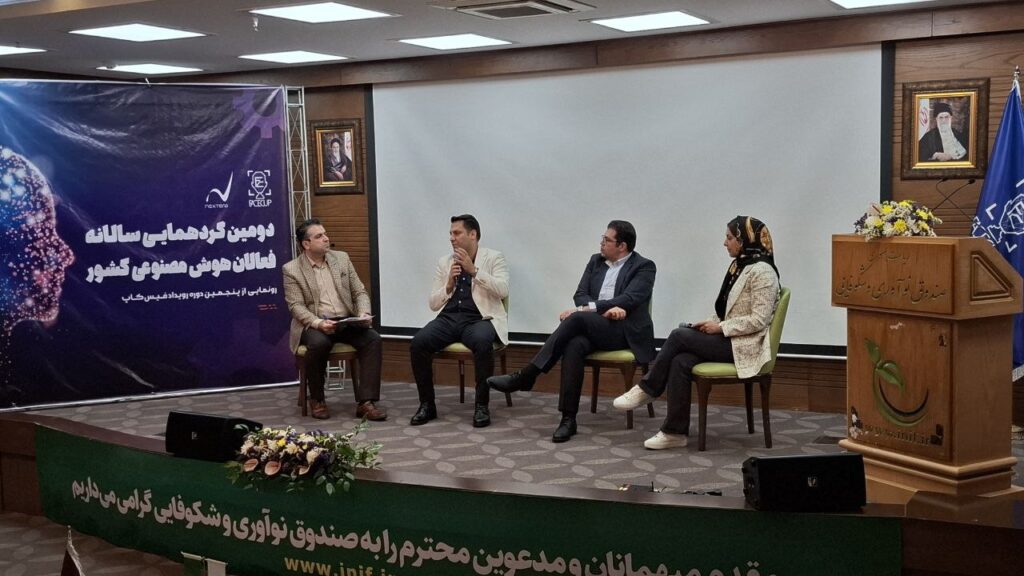The second gathering of artificial intelligence activists and the fifth annual Facebook artificial intelligence event was held in Tehran last Wednesday with the presence of more than 500 participants and prominent experts in this field. In this panel with the topic of “Artificial Intelligence Expert Panel”, Arash Sarvari as the host, talks about the future of artificial intelligence with Bahare Sharifian, director of Sepas Collection; Mehdi Hashemi, Vice President of Sarawa Business Development; And Dr. Mohammad Sabri, a faculty member of Azad University, did it. In this meeting, the challenges, opportunities and future of artificial intelligence in Iran were emphasized as well as the role of industry and university in the development of this technology.
Challenges and opportunities of artificial intelligence
Arash Sarvari started the panel by pointing out the growth and importance of artificial intelligence in various industries and pointed out the role of this technology in online platforms and its application in Iranian companies. He asked Bahare Sharifian, director of Sepas Group and one of the managers of online platforms, to explain about the role of artificial intelligence in the dot-com family.
Referring to Sepas Group’s activities in the field of technology, Bahare Sharifian said: “Our subsidiary companies are active in the field of online platforms, one of the most prominent of which is the dotcom family. “We are also active in the fields of tourism and insurance, but the introduction of artificial intelligence into this field has made our performance significantly improve, especially in the field of service provision and data analysis.”
He added: “There are still many opportunities in Iran to use artificial intelligence in the insurance industry. We have tried to use the data obtained from the purchase of insurance by customers to optimize the process of service and damage assessment. But there are still many challenges, including regulatory issues, which have made us unable to fully benefit from the potential of artificial intelligence.”
Challenges of investing in artificial intelligence
Next, Sarvari asked Mehdi Hashemi, the vice president of business development of Sarava, to talk about the state of investment in the field of artificial intelligence and the opportunities available in this field.
Mehdi Hashemi, presenting statistics on the global state of investment in artificial intelligence, said: “In 2030, about 94 billion dollars have been invested in the field of artificial intelligence, 70% of which belongs to China and the United States.” It is predicted that by 2030, this figure will reach 14 trillion dollars and bring 15.6 trillion dollars of added economic value to the world. In the Middle East, countries like Saudi Arabia and Qatar are making big investments in this area.”
He added: “Unfortunately, Iran does not yet have this amount of investment, and in order to achieve the vision of becoming one of the top ten countries in the world in the field of artificial intelligence, we need knowledge, targeted coordination and coherent investments. “The government does not have enough funds to invest in this area, so the private sector and foreign investors must come into action.”
The role of industry and university in the development of artificial intelligence
In the following, Mohammad Sabri, a member of Azad University’s academic faculty, discussed the importance of industry and university interaction in the advancement of artificial intelligence. Referring to the unique reception of this gathering, he said: “Today, more than 900 people registered to participate in this event, and in the end, 500 people attended. This shows that there is a great potential for the development of artificial intelligence in Iran, but this potential must be properly managed.”
In response to Hashemi’s question about the challenges facing talented young people in the field of artificial intelligence, Sabri said: “One of the main problems we are facing is the lack of a strong connection between industry and academia. While the universities are training specialist forces, the industry cannot use these forces properly. Therefore, a bridge should be created between these two institutions so that the trained workforce can work in real industrial projects.”
He also mentioned some of the measures taken at Azad University and said: “We have more than 2,700 students in our university unit, 70% of whom study in fields related to technology and artificial intelligence. This shows that there is a lot of interest in this field, but we need to direct these people to practical and practical projects.”
Investing in young people and startups
Continuing his discussion, Hashemi pointed out the importance of investing in Iranian youth and startups and said: “Many Iranian youth have innovative ideas and brilliant talents that can be leaders in the field of artificial intelligence. But for these talents to flourish, they need financial and educational support. “Companies like Sarava are trying to identify and support these talents, but government and private sector support should also increase in this regard.”

Mohammad Sabri said at the end of the panel: “We should use artificial intelligence as a tool to improve the economic and social conditions of the country. If we can use our knowledge and human capital properly, artificial intelligence can play a key role in the development and progress of Iran.”
Sharifian also pointed out the importance of theoretical and scientific infrastructure in the field of artificial intelligence and said: “These infrastructures are well available. Universities and schools of the country are doing serious work in this field. He hopes that more and more serious investments will be made in this area.
youth and governance; Key players in advancing artificial intelligence
Sharifian also pointed out the difference between Iran’s challenges and other countries and in his opinion: “By using the local capacities and solving the specific problems of the country, we can achieve significant progress in artificial intelligence.” Sharifi expressed hope that by focusing on this issue, we will achieve positive results in the future.
Hashemi pointed to the future of artificial intelligence from a global perspective and said: “Iran must determine its place in this global map, and the attitude of the government and the efforts of the country’s youth are the key factors in this path.” Hashemi also emphasized: “Investment in this area is very important, and by combining the right attitude, the efforts of young people, and financial support, Iran can achieve a good position in the field of artificial intelligence.”
In his conclusion, Sabri pointed out the importance of increasing resilience in the face of various challenges. “Businesses must make every effort to increase resilience and use artificial intelligence as a tool to advance this goal,” he stated. Sabri believes that with increasing resilience and intelligent use of artificial intelligence, a bright future awaits us.
The holding of this specialized panel showed that although the development path of artificial intelligence in Iran is not smooth, but with detailed planning and effective interaction between the industry and the university, we can hope for the future of this technology in the country.
All the experts present in this event pointed out that although Iran is facing many challenges in the field of artificial intelligence, considering the high capacities in the country, especially talented youth and leading universities, we can imagine a bright future for this technology in Iran. was
RCO NEWS
















